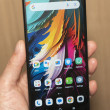
Google Pixel 9
Spectrum and Xfinity Launch Satellite SOS and Messaging
Spectrum Mobile and Xfinity Mobile have both launched emergency messaging via satellite for the Samsung Galaxy S25 series and Google Pixel 9 series Android phones. In the coming weeks, they will also launch non-emergency text messaging via satellite. The service offers basic connectivity in cellular dead zones, and uses the NTN satellite feature of those specific phones. Both Spectrum and Xfinity use Verizon's network, and Verizon enabled non-emergency satellite messaging just yesterday. All three companies rely on Skylo to provide this satellite service. NTN is an industry standard and specific technology found only in some phones, that lets a phone communicate directly with existing satellite networks, much like Apple's proprietary satellite features on iPhone. Other satellite services for phones (Starlink and AST SpaceMobile) offer greater phone compatibility, but require new satellites to be launched.
Verizon Launches Non-Emergency Satellite Messaging
As announced and promised last August, Verizon is now launching non-emergency text messaging via satellite in cellular dead zones for compatible Android phones. Currently, phones compatible with this NTN technology include the Google Pixel 9 series and the Samsung Galaxy S25 series. Verizon already offers emergency SOS and location sharing via satellite for these phones. Verizon is also working with AST SpaceMobile to offer expanded satellite service within two years, including more types of services and greater phone compatibility.

Android Gaining Support for Auracast with Newer Bluetooth Hearing Aids
The newest beta version of Android introduces a new feature that lets certain supported phones — such as the Pixel 9 series — use Auracast with Bluetooth hearing aids that support it. Auracast is a broadcast audio technology that lets many Bluetooth audio devices (such as earbuds and hearing aids) tune in to the same audio source at one time. The technology is starting to roll out in places like train stations, theaters, and gyms. Auracast is an optional part of LE Audio, the new Bluetooth audio standard. Samsung has also enabled Auracast for compatible hearing aids with its One UI 7 software on Galaxy devices. Google is also adding a feature to Pixel phones that lets users tune in to a specific local Auracast stream by a scanning a QR code. Last year, Google added Auracast info to Google Maps, to help people find nearby locations that offer the technology.
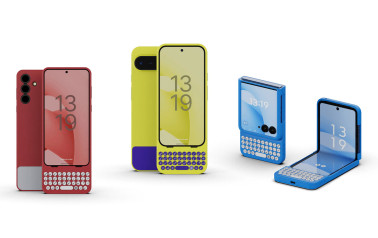
Clicks Keyboard Case Comes to Android
Clicks, the phone case that adds a physical QWERTY keyboard to the bottom of your phone, is expanding to offer models for several popular models of Android phones. (Clicks was previously only available for iPhones.) The new case models are for the Samsung Galaxy S25, Google Pixel 9 and 9 Pro, and the Motorola razr+. While all models expand screen real estate by moving the keyboard off the display, this benefit is perhaps most acute for the outer display of the Motorola razr+. Each is available in "Onyx" black or another bright color (Pinot red for Samsung, Surge yellow for Google, and Electric blue for Motorola). All three are available for $99 in special pre-order pricing until March 21st ($139 after that date). Expected shipping dates vary by model, ranging from April 30 for the Google version to "after June" for the Pinot color for Samsung.
Google Reveals New Features in December's Pixel Feature Drop
Google's December software update for Pixel devices includes a long list of small new features. You can now ask Gemini Advanced to remember things about you to improve its responses. This "saved info" feature can remember things like if you're a vegetarian. Foldable devices now support Dual Screen, which puts the real-time viewfinder on both displays at the same time. The relatively new Pixel Screenshots app now automatically categorizes your screenshots and lets you apply filters when searching. It also adds new suggested actions, Like creating a calendar invite, getting directions, or adding a ticket to Google Wallet. The Recorder app has a new "Clear voice" option that reduces background noise. A new Simple View mode "increases your phone’s font size and touch sensitivity, making it easier to see and use controls, apps and widgets." A new Identity Check anti-theft feature automatically requires biometric authentication to change sensitive settings when it detects that you're in a new location. Other features and apps getting minor improvements include Gboard, Gemini Live, Call Screen, Made You Look, Emoji Kitchen, Circle to Search, Now Playing, Instagram, and Snapchat. Google also announced several new features coming to both Pixel and non-Pixel Android devices this month.
Verizon Launching Satellite Service for Android Phones That Support NTN
Verizon has announced a new satellite connectivity service that will offer SOS and location-sharing features in cellular dead zones with compatible Android phones starting this fall. Non-emergency messaging will launch next year. The first compatible Android devices (using the 3GPP rel. 17 NB-NTN standard) are the new Pixel 9 series from Google and "upcoming Galaxy devices" from Samsung. Verizon is partnering with Skylo to offer the service. Skylo's service works similarly to Apple's "Emergency SOS via satellite" feature, and will bring Samsung (and Google) phones up to parity with iPhones in Verizon's lineup. Verizon also has a partnership (and investment stake) with AST SpaceMobile, which will offer similar functionality that works with existing phones. However that service is not available yet because more new satellites must be launched (literally) before it's ready for consumers. This new, Skylo-based service allows Verizon to offer satellite connectivity — for compatible phones — sooner. This service requires specific hardware support in the phone, including an NTN modem and L-band antenna. Qualcomm's upcoming X80 modem includes NTN support and is expected to appear in the next wave of flagship Android phones. MediaTek also offers chips that support NTN. While the Pixel 9 series comes with satellite service from Google, Verizon says it is "working towards a plan to move Pixel 9 to Verizon" satellite service. Both T-Mobile and AT&T seem to be skipping NTN and relying on future systems that require new satellites but will work with existing phones; AT&T is also partnering with AST, while T-Mobile is working with SpaceX Starlink.
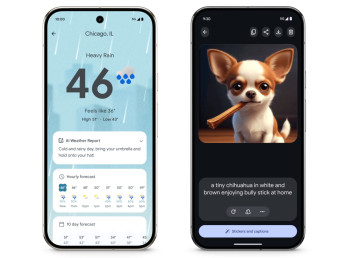
Google Brings New AI Apps to Pixel Phones
Google today announced several completely new apps for Pixel phones, some powered by Google Gemini AI. The most basic is a Pixel Weather app. A new Call Notes feature transcribes phone calls to make phone conversations searchable via AI. (Call Notes runs completely on-device for privacy, and both parties are notified when it's enabled.) A new Pixel Screenshots app does something similar, letting you search all of your screenshots using AI. A new Pixel Studio app is dedicated to visual generative AI, letting you create and tweak images using text prompts. It can create styled or realistic images (unlike Apple's generative AI) and lets you add text and stickers. Finally, Gemini Live is a new, conversational version of Google's Gemini multi-modal AI. It requires a paid subscription to Gemini Advanced, but a free year is included with the new Pixel 9 series.
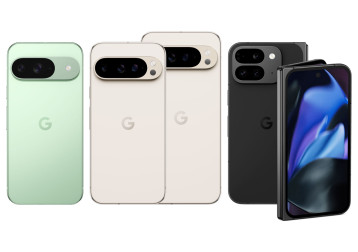
Google's Pixel Pro Phone now Comes in Two Sizes
Google has officially revealed full details of its newest flagship phone lineup: the Pixel 9 series. For the first time, Google is offering the higher-end "Pro" model in two sizes: regular, with a 6.3-inch display, and "XL", with a 6.8-inch display. The larger model also has a larger battery and faster wired charging (37W vs. 27W), but specs and features are otherwise identical between the two Pro models. All of the new Pixel 9 models have a "industry-leading" AI performance thanks to a new Google Tensor G4 chip and at least 12 GB of RAM. As we previously reported, all Pixel 9 models include satellite radios, for a new "Satellite SOS" feature. Similar to Apple's version of this feature, it lets you contact emergency responders and share your location via satellite, and the service is free for two years. Google also claims the Pixel 9 is twice as durable, has a 35% brighter display, and gets 20% better battery life when active, compared to the Pixel 8. The ultra-wide camera also gets a boost to 48 megapixel, and the front camera has been upgraded with auto-focus. Google has also switched from optical to ultrasonic in-display fingerprint readers, which it says are 50% faster. A revamped panorama mode adds HDR and Night Sight. All Pixel 9 series come with seven years of full OS updates. The Pixel 9 Pro and Pixel 9 Pro XL add a 48-megapixel 5x telephoto camera, which Google claims can zoom up to 20x for video with no loss of quality. They have the same 50 megapixel main camera and 48 megapixel wide camera as the Pixel 9, but the auto-focus selfie camera gets a boost to 42 megapixel. The Pro models also come with more RAM (16 GB), UWB, and a free one-year subscription to Gemini Advanced, including access to the Gemini Live conversational assistant. The Pixel 9 Pro Fold carries over most of the specs and features of the Pixel 9 Pro while adding an 8-inch tablet display inside. The cameras get a bit of a downgrade, though, with the wide, 5x tele, and selfie cameras clocking in at just over 10 megapixel each. The Pixel 9 starts at $799, the Pixel 9 Pro starts at $999, and the Pixel 9 Pro XL starts at $1,099. All three come with just 128 GB of storage. 256 GB is available for $100 extra; the Pro models are also available with 512 GB or 1 TB. The Pixel 9 Pro Fold starts at $1,799 (with 256 GB storage). Pre-orders run through August 21st, and include free double storage with some carriers (including AT&T, excluding the Fold). The Pixel 9 and Pixel 9 Pro XL ship August 22, while the smaller Pixel 9 Pro and Pixel 9 Pro Fold ship later, starting Sept. 4.
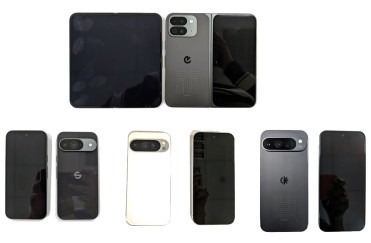
Google Pixel 9 Series Revealed: at Least Four Models This Year
Google's Pixel 9 series of phones has leaked via official regulatory filings for Taiwan. In addition to a standard, Pro, and Fold model, this year's lineup will include a Pixel 9 Pro XL, meaning the Pro model will come in two sizes. [Update: Google has also posted revealing teaser videos via official social media channels, essentially confirming the leaked info.] The Pixel 9 Pro Fold has been revised with a shape and size that appears closer to Samsung's Z Fold. All three Pro models appear to have periscope telephoto camera lenses for extended optical zoom. The Pro models also have UWB, while all four models have a Thread radio for better Matter smart-home support. Some of these models have also recently been approved by the FCC. Those FCC approval documents do not contain photos, but do confirm the presence of not only Thread radios, but dual-band satellite (NTN) connectivity as well.








